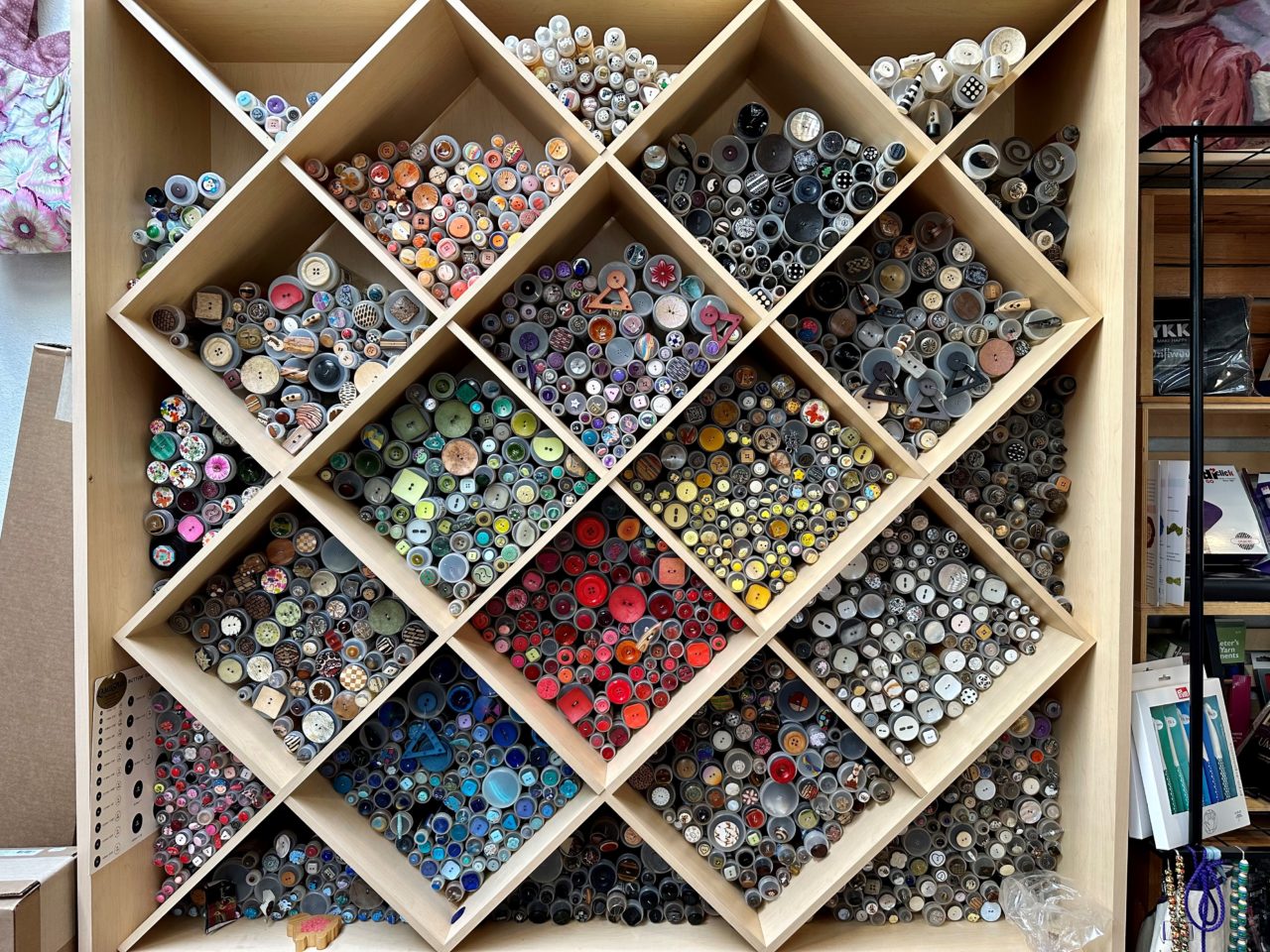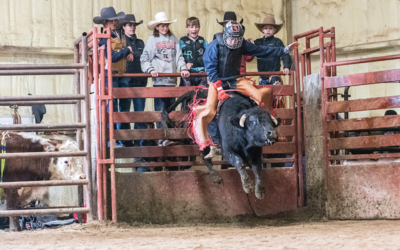– By Emily Kemme –
Shirley Ellsworth’s idea for Lambspun began 30 years ago when a yarn store, Wool Works, closed. After a fruitless search for another store nearby that sold yarn, she decided to make her own.
She took classes from textile authorities around the country and began a cottage industry selling hand-dyed yarns and fibers. Her store, which features baked bread and looms large and small on which you can test your mettle, has even inspired knitting-themed murder mysteries. Ellsworth gathers it all under the Mediterranean-style roof of a Fort Collins landmark dating back to 1937.
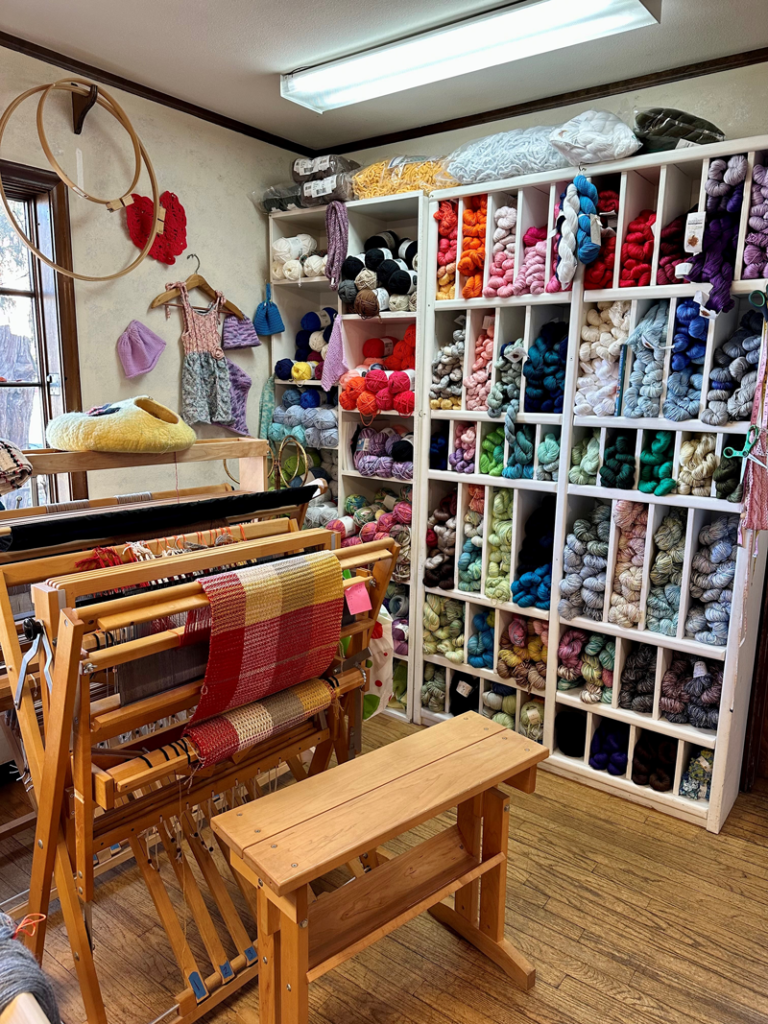
One of the larger looms at Lambspun and a wall of yarn to choose from—one of many. Photo by Emily Kemme.
As the business outgrew her home and then a tiny shop in Old Town, she and her husband purchased the historic farm complex on the corner of Lemay and Lincoln avenues. The main building, originally the Fisher Farmhouse and Hoffman Homestead, was likely won in a card game by Cliff O. Fisher. It was sold in 1979, and the rural farmhouse evolved into an Italian fine dining restaurant, Berardi & Sons.
After the Ellsworth’s purchase in 1994, they preserved the original tile, stucco and a fountain whose waters today accompany buzzing bees feasting on floral nectar. Diners dig into omelets smothered in smoked green-chile, quiche and sandwiches served on homemade bread at The Backporch Cafe.
Open year-round, the fiber center offers classes and a gallery where artists display their creations. In addition to weaving, those not well-versed in wool art can learn to knit (and purl), felt and spin yarn.
Ellsworth’s specialty is high-quality silks, cashmere and wools sourced near and far, including fibers from Colorado sheep and alpaca, and as far away as New Zealand and Australia.
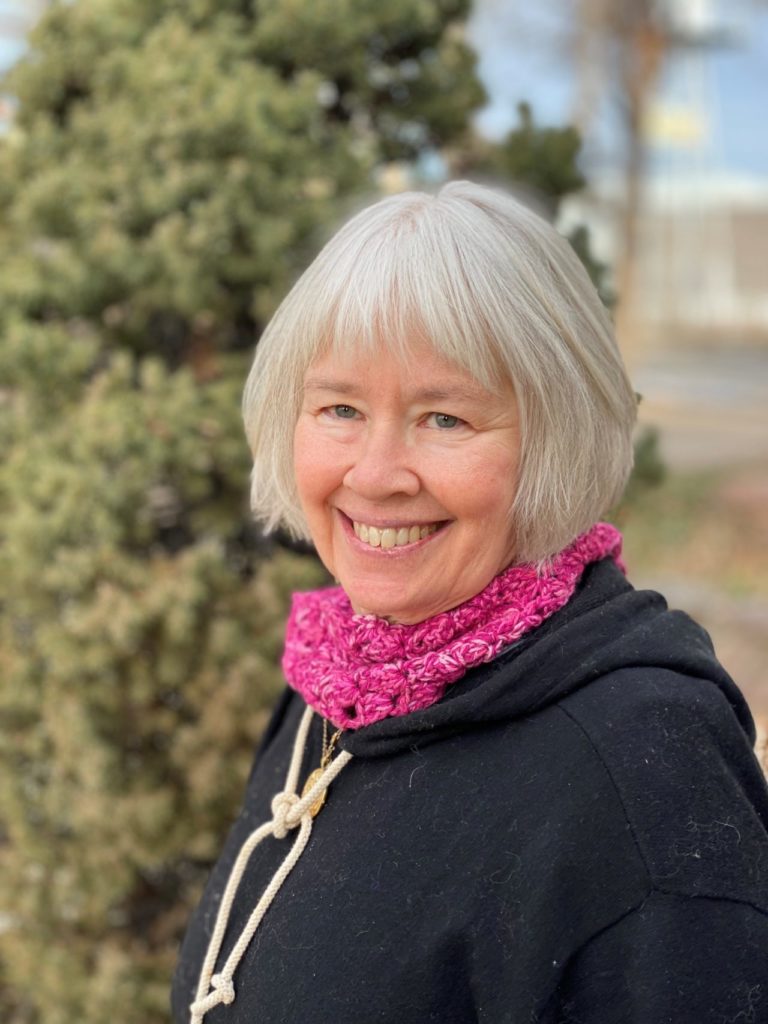
Shirley Ellsworth, owner, Lambspun.
“We dye our own yarns and spin them. It’s working from the sheep to the finished product, the growers to the artist,” Ellsworth says. “People come from all over the country to learn how to spin yarn.”
The fiber center shop is so well-known, local author and New York Times bestseller Maggie Sefton developed a murder mystery series centered on it. In 2005, she penned “Knit One, Kill Two,” the first of 16 knitting mysteries set at Lambspun.
Ellsworth is a character in the book—Mimi—and says fans visit from far and wide. Readers—mostly knitters—often order the series, and since Sefton’s death a year ago, Ellsworth and her Lambspun employees sign the books.
Some of the artisans’ favorite creations are felted slippers, owls and mushrooms, and knitted face cloths.
“Then they move on to scarves, sweaters, ponchos and bigger items,” she says. Many of the pieces can be bought in the Lambspun gallery.
A wall of buttons—crafted from handmade wood, glass, antlers, coconut and other natural materials—are displayed in a case, encompassing a selection that makes it tough to choose a favorite.
Lambspun’s weaving classes start small, like table runners and place mats. Interior decorators take the class to make pillows and throws to match home decor. Looms range from $19 styles suitable for making small wall decor up to $5,000 floor looms that can tackle weaving a rug.
“We teach people how to use the equipment and then they can buy one to take home if they like weaving,” Ellsworth says.
Another of Lambspun’s charms is the on-site restaurant, whose ownership changed hands in November. Run by Mike Cooper for 25 years, best friends Gene Fiechtl and Michael Sheldon took the helm with the intention of preserving Cooper’s legacy. Before Cooper cast off, he taught them his baking style.
Fiechtl and Sheldon bring decades of food industry experience to their kitchen. Fiechtl’s background includes restaurant management, food sales and distribution with national supply companies and time in front of a hot stove. Similarly, Sheldon’s work includes opening corporate restaurant chains as diverse as Applebee’s to fining dining, and stints as a corporate trainer for P.F. Chang’s in Centerra.
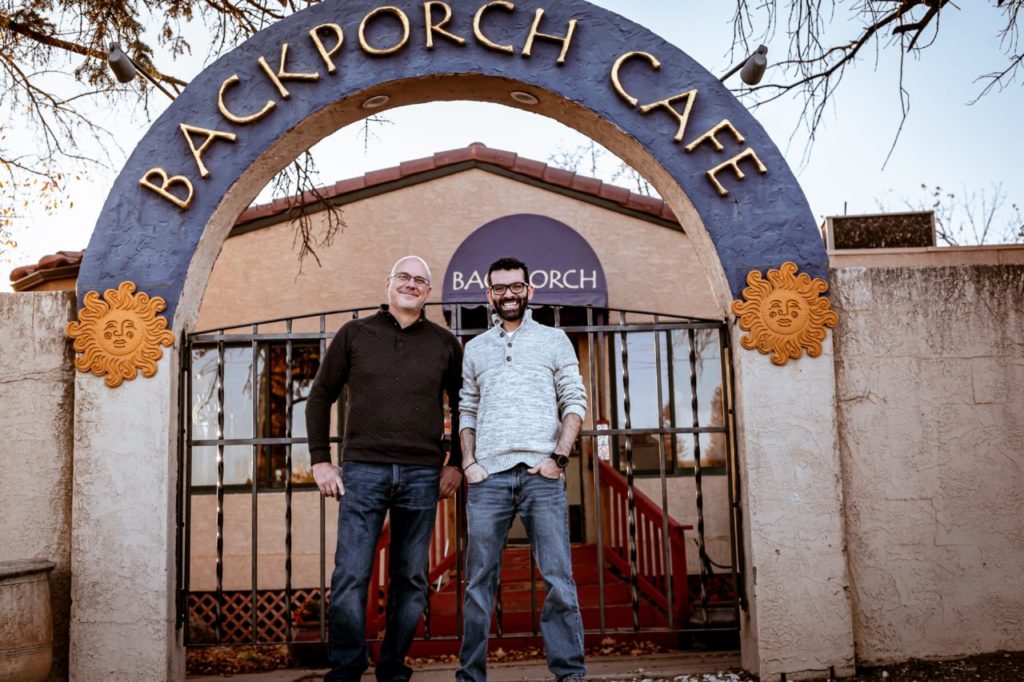
Gene Fiechtl and Michael Sheldon, co-owners, Backporch Cafe.
Their takeaway on running a restaurant post-COVID is double-pronged. “The hospitality business is about serving people,” Fiechtl says, noting their best employees are the ones whose statements in interviews about being hard workers are demonstrated in real time.
“But along with high service standards, we look at costs. We don’t need a 35-item menu when 25 items will do,” he explains.
They want to be known for baking, the food served and the overall experience. Working during the pandemic at Vern’s Place in LaPorte, Sheldon and Fiechtl learned the value of using ingredients on multiple plates.
“Using an item widely helps rotate it faster and avoid spoilage. For example, green chile is a Colorado staple. You can do a lot with it, alone or as a topper, making it a double or even triple use item,” Sheldon explains. Added to baking between 20-40 loaves of bread daily, their focus is on serving the best possible food for their clientele.
At Lambspun, that means the knitters, weavers and other artisans who gather for hours in the workshop’s cozy surroundings are also in a place where food is always celebrated.
“Our customers can eat on the shop side, or if someone’s taking a class and they want a coffee—or an Eye Opener (pear vodka with apple juice), they can get one,” Ellsworth says. “Food is everywhere here, we never restrict it,” noting that people are considerate, and the shop has a wonderful cleaning crew.
Fiechtl hopes time spent at Lambspun and the Backporch is like a comfortable backyard party, one that serves a range of purposes to fit diverse needs.
That makes it a good spot to source your creative juices and feed your stomach, all at once.
___________________________________
Emily Kemme is a writer who has had many relatives try to teach her how to knit. She doesn’t hope for success in the fiber arts world soon, but she can sew on a button.

